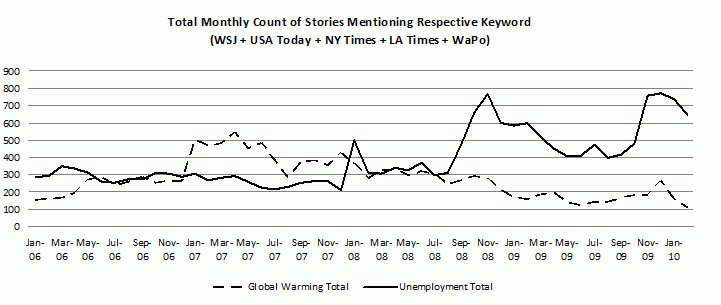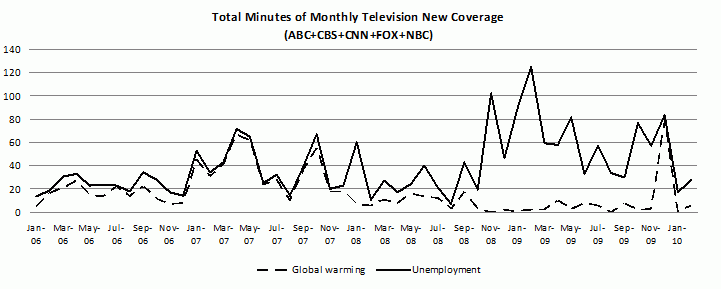Google Insights is a publically available online tool for tracking aggregate Google search activity over time for specific geographic areas. Recent research shows that Google search terms are a powerful tool to predict public health epidemics (Pelat et al. 2009 and Valdiva and Monge-Carella 2010) and economic activity (Choi and Varian 2009, D’Amuri and Marcucci 2009, and Varian 2009). Given the current macroeconomic situation – the end of 2007 was the beginning of the most significant economic downturn in the US since the Great Depression – this tool provides a lever for studying the relationship between the business cycle and public opinion.
In particular, the US has experienced substantial erosion in public concern about environmental issues. To what extent do recessions affect public opinion about the environment?
In recent research (Kahn and Kotchen 2010), we use data on Google searches as a measure of public opinion in order to investigate how changes in the business cycle affect interest in the headline environmental issue of the day, climate change. Using data from Google Insights, we have created a weekly database from January 2004 through February 2010 of keyword searches by state for two terms – “global warming” and “unemployment.” We then ask the question: How do changes in a state’s unemployment rate affect internet search activity for these two keywords within the state?
We find that higher unemployment rates within a state decrease internet search activity for global warming, but increase search activity for unemployment. Based on this revealed preference for interest in global warming, therefore, it appears that recessions crowd out concern for the environment, while not surprisingly increasing concern about unemployment. Interestingly, the magnitudes of the two effects are very similar despite having opposite signs, which is at least consistent with the notion that one crowds out the other.
Red states and blue states
Given the well-known ideological divide between “red states” and “blue states” in the US on environmental issues, we also explore how overall state political ideology affects the association between state unemployment rates and Google searches. For each state, we collect additional data on the share of votes cast for the Democrat John Kerry in the 2004 Presidential Election. We find that in more Democratic leaning states, the decline in global-warming searches is larger, but the increase in unemployment searches is smaller. One possible explanation for the former result is that Republican concern about climate change is simply lower and less variable.
Unemployment and climate change denial
We then take advantage of two waves of a national survey with common questions about climate change to investigate how responses differ within states based on changes in the states’ unemployment rate. We find that an increase in a state’s unemployment rate is associated with a decrease in the probability that residents think global warming is happening, and with a reduction in the certainty of those who think it is. Higher unemployment rates are also associated with views that we should do less with respect to policies designed to reduce global warming. Using evidence from 11 monthly surveys in California, we find that an increase in a county’s unemployment rate is associated with a significant decrease in county residents choosing the environment as their most important issue area.
Taken together, our findings provide the first empirical estimates of how unemployment rates affect environmental concern. But what mechanisms are likely to underlie the results? From a psychology perspective, the pattern is consistent with Maslow’s (1943) hierarchy of needs, which is closely related to an economic explanation that environmental concern is a luxury good. The media is also likely to play an important causal and/or reinforcing role.
Figures 1 and 2 show trends in actual media coverage of global warming and unemployment between January 2006 and January 2010. Figure 1 shows a downward trend in the number of print media stories about global warming in major national newspapers since the beginning of 2007. At the same time, the number of print media stories about unemployment exhibits an upward trend. Figure 2 reports television media coverage in terms of minutes of coverage by month. Note that prior to November 2007, global warming and unemployment receive a similar number of minutes, but thereafter coverage of global warming drops off (with the exception of the spike at the end of 2009 corresponding with the COP15 meetings in Copenhagen); meanwhile coverage of unemployment is substantially higher, especially beginning in the Fall of 2008 when the recession started to take hold.
Figure 1. Print media coverage of “global warming” and “unemployment.”
Note: Data collected using keyword searches in Google news and summing the number of stories listed by month in the 5 major newspapers with national coverage.
Figure 2. Television coverage of “global warming” and “unemployment.”
Note: Data collected using keyword searches in the Vanderbilt Television News Archive and summing the number of coverage minutes by month for all 5 national networks.
A diminishing political will
While more work is needed to understand what shapes environmental preferences, our research suggests a clear pattern. Higher unemployment rates – at least when levels reach those observed during the recent recession – erode public concern about the environment. Our research thus contributes to the literature on the cost of recessions. The pain suffered by unemployed workers and homeowners who have lost their homes to foreclosure is well documented in the popular press. While macroeconomists have emphasised the costs of recession, past environmental research has argued that such slumps offer a “green silver lining” as the slowdown in economic activity helps to lower pollution levels (Kahn 1999, Chay and Greenstone 2003).
Our results, however, point to a countervailing effect. During recessions there may be diminished political will and interest to enact new environmental legislation and to enforce existing laws intended to internalise externalities. At the state level, for example, there is an upcoming ballot initiative (Proposition 23) in California to delay the state’s climate-change policy (AB32) until the unemployment rate falls below 5.5%. At the national level, momentum in the US to pass ambitious energy and climate legislation has come to a complete halt. While similar patterns are occurring throughout Europe, understanding more about the relationship between environmental concern and the business cycle in European nations is a subject for future work.
References
Chaoi, H and H Varian (2009), “Predicting the Present with Google Trends,” Working paper, Google Inc.
Chay, K and M Greenstone (2003), “The Impact of Air Pollution On Infant Mortality: Evidence From Geographic Variation In Pollution Shocks Induced By A Recession”, The Quarterly Journal of Economics, 118:1121-1167.
D’Amuri, Francesco and Juri Marcucci (2009), “The predictive power of Google data: New evidence on US unemployment”, VoxEU.org, 16 December.
Kahn, ME (1999), “The Silver Lining of Rust Belt Manufacturing Decline”, Journal of Urban Economics, 46:360-76.
Kahn, ME and MJ Kotchen (2010), “Environmental Concern and the Business Cycle: The Chilling Effect of Recession”, NBER Working Paper 16241.
Maslow, AH (1943), “A Theory of Human Motivation”, Psychological Review, 50:370-396.
Varian, Hal (2009), “Doing economics at Google”, VoxEU.org, 8 May, Interview by Romesh Vaitilingam.
Pelat, C, C Turbelin, A Bar-Hen, A Flahault, and A Valleron (2009), “More Diseases Tracked by Using Google Trends”, Emerging Infectious Diseases, 15:1327-1328.
Valdivia, A and S Monge-Corella (2010), “Diseases Tracked by Using Google Trends, Spain”, Emerging Infectious Diseases, 16:168.





